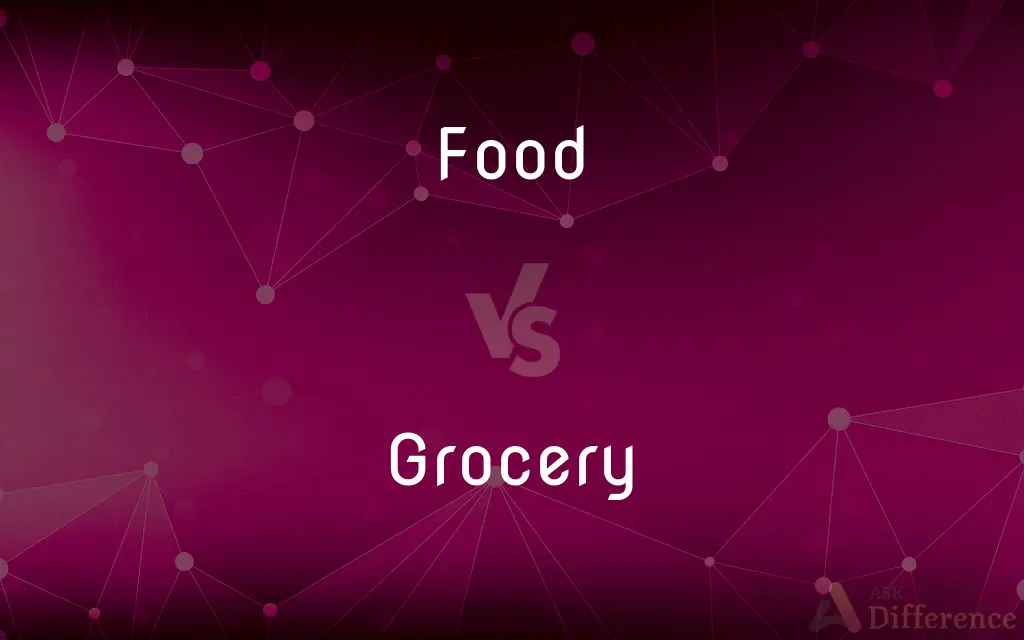Food vs. Grocery — What's the Difference?
By Maham Liaqat & Urooj Arif — Updated on April 26, 2024
Food refers to any nutritious substance consumed for energy and growth, while grocery encompasses a variety of items sold in stores, including food, beverages, and household goods.

Difference Between Food and Grocery
Table of Contents
ADVERTISEMENT
Key Differences
Food is the term used to describe any substance, typically of plant, animal, or fungal origin, that is consumed to provide nutritional support for the body. It is essential for life, providing energy, maintaining life, or stimulating growth. On the other hand, groceries refer to items purchased from a grocery store or supermarket, which not only include food and beverages but also other household and personal care products. Groceries are a broader category that encompasses food as a subset.
While food specifically focuses on the nutritional and sustenance aspects, playing a crucial role in health and survival, groceries cover a wider spectrum of consumer goods. This distinction highlights how the term "grocery" has evolved to represent the retail experience and the array of products available for purchase, whereas "food" remains centered on consumption and nutrition.
The shopping experience for food versus groceries can also differ significantly. Purchasing food often involves selecting fresh produce, meats, and dairy, focusing on quality and nutritional value. In contrast, shopping for groceries may include buying a variety of non-food items, such as cleaning supplies and toiletries, alongside food products. This difference underlines the diverse needs groceries fulfill beyond just sustenance.
The cultural and societal implications of food and groceries vary. Food is deeply intertwined with cultural identity, traditions, and social gatherings, reflecting a community's heritage and values. Conversely, groceries as a category reflect consumer habits, economic factors, and the convenience of accessing a variety of goods under one roof, showcasing societal trends and lifestyle choices.
Comparison Chart
Definition
Substances consumed for nutritional support.
A broad category of items sold in grocery stores, including food.
ADVERTISEMENT
Focus
Nutrition and sustenance.
Variety of consumer goods, including food and household items.
Purpose
To provide energy and support growth.
To supply a wide range of daily needs.
Cultural Significance
Central to traditions and social practices.
Reflects consumer habits and lifestyle choices.
Shopping Experience
Focused on fresh produce and nutritional value.
Includes a variety of items beyond food, like household supplies.
Compare with Definitions
Food
Integral to cultural identity and traditions.
The festival is celebrated with traditional foods that have been passed down through generations.
Grocery
Items, including food, sold in a grocery store.
Their grocery list included both food items and cleaning supplies.
Food
Nutritious substances eaten or drunk to maintain life and growth.
She emphasized the importance of including a variety of foods in her diet.
Grocery
Encompasses a variety of consumer goods.
The grocery store expanded its selection to include organic and gluten-free products.
Food
Essential for providing energy.
Athletes consume food rich in carbohydrates for sustained energy.
Grocery
Associated with the retail experience.
The new grocery store layout made it easier to find their favorite products.
Food
Focuses on consumption and nutrition.
The nutritionist discussed food choices that support overall health.
Grocery
Reflects consumer habits and convenience.
Online grocery shopping has become popular for its convenience.
Food
Can be of plant, animal, or fungal origin.
The menu featured foods from all three origins to cater to diverse dietary preferences.
Grocery
Includes non-food items like household and personal care products.
Aside from fresh produce, they picked up laundry detergent and shampoo from the grocery store.
Food
Food is any substance consumed to provide nutritional support for an organism. Food is usually of plant, animal or fungal origin, and contains essential nutrients, such as carbohydrates, fats, proteins, vitamins, or minerals.
Grocery
A grocer's shop or business.
Food
Any nutritious substance that people or animals eat or drink or that plants absorb in order to maintain life and growth
Music is food for the soul
Baby foods
Food shortages
We need food and water
They had eaten their food and slept
Grocery
A store selling foodstuffs and various household supplies. Also called grocery store.
Food
Material, especially carbohydrates, fats, and proteins, that an organism uses for energy, growth, and maintaining the processes of life. Plants, algae, and some bacteria make their own food through photosynthesis, while animals and most other organisms obtain food by consuming other organisms or organic matter.
Grocery
Groceries Commodities sold by a grocer.
Food
A specified kind of nourishment
Breakfast food.
Plant food.
Grocery
(usually groceries) retail foodstuffs and other household supplies.
Food
Nourishment eaten in solid form
Food and drink.
Grocery
A shop or store that sells groceries; a grocery store.
Food
Something that nourishes or sustains in a way suggestive of physical nourishment
Food for thought.
Grocery
(intransitive) To go grocery shopping.
Food
(uncountable) Any solid substance that can be consumed by living organisms, especially by eating, in order to sustain life.
The innkeeper brought them food and drink.
Grocery
(transitive) To furnish with groceries.
Food
(countable) A foodstuff.
Grocery
The commodities sold by grocers, as tea, coffee, spices, etc.; - in the United States almost always in the plural form, in this sense.
A deal box . . . to carry groceries in.
The shops at which the best families of the neighborhood bought grocery and millinery.
Food
Anything that nourishes or sustains.
The man's inspiring speech gave us food for thought.
Mozart and Bach are food for my soul.
Grocery
A retail grocer's shop or store.
Food
What is fed upon; that which goes to support life by being received within, and assimilated by, the organism of an animal or a plant; nutriment; aliment; especially, what is eaten by animals for nourishment.
Grocery
A marketplace where groceries are sold;
The grocery store included a meat market
Food
Anything that instructs the intellect, excites the feelings, or molds habits of character; that which nourishes.
This may prove food to my displeasure.
In this moment there is life and foodFor future years.
Grocery
(usually plural) consumer goods sold by a grocer
Food
To supply with food.
Food
Any substance that can be metabolized by an organism to give energy and build tissue
Food
Any solid substance (as opposed to liquid) that is used as a source of nourishment;
Food and drink
Food
Anything that provides mental stimulus for thinking
Common Curiosities
What is the difference between food and grocery?
Food refers specifically to nutritious substances consumed for energy and growth, while grocery includes a broader range of items sold in stores, including food and non-food items like household goods.
Why is food important?
Food is essential for providing energy, supporting growth and health, and is central to cultural traditions and social gatherings.
Can non-food items be considered groceries?
Yes, non-food items like cleaning supplies, personal care products, and other household goods are considered groceries.
How do food and grocery shopping experiences differ?
Food shopping focuses on selecting nutritious substances for consumption, often emphasizing fresh produce and quality. Grocery shopping can include a broader range of items, catering to various daily needs beyond just sustenance.
What types of items are included in groceries?
Groceries encompass a wide range of items, including but not limited to, fresh produce, packaged foods, beverages, cleaning supplies, and personal care products.
Are groceries only sold in grocery stores?
While traditionally sold in grocery stores, groceries can also be purchased from supermarkets, online retailers, and other outlets offering a variety of consumer goods.
Can the term 'grocery' refer to online shopping as well?
Yes, the term 'grocery' can also apply to items purchased through online shopping platforms, emphasizing the convenience and variety of products available digitally.
How do cultural traditions influence food choices?
Cultural traditions play a significant role in determining food choices, with certain dishes and ingredients being central to celebrations, religious practices, and communal gatherings.
What role do groceries play in daily life?
Groceries fulfill a variety of daily needs, from nutrition and hygiene to household maintenance, reflecting consumer preferences and lifestyle choices.
How has the concept of groceries evolved over time?
The concept of groceries has expanded to include a wide range of products beyond traditional food items, reflecting changes in consumer habits, advancemen
Share Your Discovery

Previous Comparison
Furry vs. Plushie
Next Comparison
Skill vs. CapacityAuthor Spotlight
Written by
Maham LiaqatCo-written by
Urooj ArifUrooj is a skilled content writer at Ask Difference, known for her exceptional ability to simplify complex topics into engaging and informative content. With a passion for research and a flair for clear, concise writing, she consistently delivers articles that resonate with our diverse audience.
















































